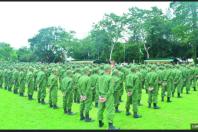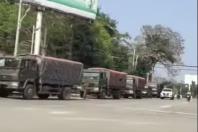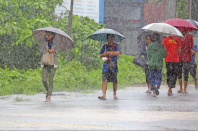Mr. Deng Xijun, the Special Representative for Asian Affairs of Ministry of Foreign Affairs of China, visited Nay Pyi Taw on April 1 and discussed some aspects, including peace issue, with the Chairman of the State Administration Council (SAC), Senior General Min Aung Hlaing. They also discussed the important sector of trade in the border region in addition to the dialogues with ethnic armed groups, the conditions of China's assistance regarding the peace process, the matters of cooperation between the two countries to eradicate drugs, online gambling and online fraud.
However, looking at the battles that took place in the northern Shan region, the ongoing battles and the military situation in Kachin and Rakhine states, some towns and army bases have been seized by ethnic armed groups in important trade areas along the China-Myanmar border and in areas related to China's interests and can see the acquisition of territorial dominance. China, on the other hand, wants Myanmar's stability and is conducting negotiations between the SAC and armed groups in peace matters for the mutual benefit of the two countries but the fact that the armed groups that have occupied territories along the border between the two countries are independent of China has drawn criticism from the other side. At a time when armed groups, accused of acting as China's proxies, are occupying the border trade gates and central areas for trade, the Chinese special representative visit to Nay Pyi Taw and the discussion of trade issues in the two border regions is difficult to consider as a mutually beneficial issue at present. There are also reviews that it may not be a good situation to discuss the trade issue between the two countries when the SAC has not yet been able to regain military control over the lost territories and border areas that are important for trade.
In addition, when armed groups occupy military bases one by one, China often conducts military exercises using live ammunition on the border between the two countries. Recently, when the Kachin Independence Army (KIA) was occupying military bases near Laiza in Kachin State, a military exercise using live ammunition was conducted on the Chinese side of the China-Myanmar border on April 2.
Amidst the backdrop of ethnic armed groups occupying significant border territories, scrutiny intensifies over the recent visit of the Chinese special representative to Nay Pyi Taw. Drawing parallels to a historical precedent, when the Bombay Burmah Trading Corporation was dissatisfied with the Myanmar King's actions regarding timber before the Third Anglo-Burmese War in 1885, Colonel Sladen's visit to meet with King Thibaw was marked by a demand for facts that proved challenging to comply with.
On the other hand, the United States, a superpower country, has increased aid to Myanmar by more than 120 million dollars, and the leaders of the K3C, a mostly Christian armed group associated with them, have recently been summoned to Washington for talks.
Considering these circumstances, it is not wrong to say that Myanmar's internal situation is facing a worrying situation due to various pressures, and it is facing the danger of becoming a proxy war between the superpowers. In such a situation, it is true that the country's independence and sovereignty are faced with a dangerous situation that can be attacked at any time.
As a country, for the first time since independence in 1948, it is now necessary to be aware of the fact that we are facing a critical situation for the maintenance of sovereignty. Otherwise, the situation in Myanmar could be worse than that of post-Saddam Hussein era in Iraq, post-Gaddafi era in Libya and post-Tito era in Yugoslavia.
In order to survive the proxy war, actions and pressures of the superpower countries that reflect modern colonialism, Myanmar needs to require two main efforts: the development of true democracy and the creation of a true federal union.
Therefore, at the present time, the Daily Eleven newspaper urges that the only political way out is to speed up to build true democracy and a true federal union in order to protect the sovereignty of the country and not to lose the country's independence, and it will require all-round efforts by stakeholders.











